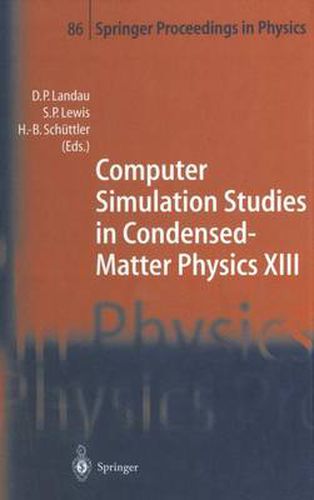Readings Newsletter
Become a Readings Member to make your shopping experience even easier.
Sign in or sign up for free!
You’re not far away from qualifying for FREE standard shipping within Australia
You’ve qualified for FREE standard shipping within Australia
The cart is loading…






This title is printed to order. This book may have been self-published. If so, we cannot guarantee the quality of the content. In the main most books will have gone through the editing process however some may not. We therefore suggest that you be aware of this before ordering this book. If in doubt check either the author or publisher’s details as we are unable to accept any returns unless they are faulty. Please contact us if you have any questions.
Almost fifteen years ago, because of the phenomenal growth in the power of computer simulations, The University of Georgia formed the first institu tional unit devoted to the use of simulations in research and teaching: The Center for Simulational Physics. As the international simulations community expanded further, we sensed a need for a meeting place for both experi enced simulators and neophytes to discuss new techniques and recent results in an environment which promoted extended discussion. As a consequence, the Center for Simulational Physics established an annual workshop on Re cent Developments in Computer Simulation Studies in Condensed Matter Physics. This year’s workshop was the thirteenth in this series, and the con tinued interest shown by the scientific community demonstrates quite clearly the useful purpose that these meetings have served. The latest workshop was held at The University of Georgia, February 21-25, 2000, and these proceed ings provide a status report on a number of important topics. This volume is published with the goal of timely dissemination of the material to a wider audience. We wish to offer a special thanks to the IBM Corporation for its generous support of this year’s workshop. We also acknowledge the Donors of the Petroleum Research Fund, administered by the American Chemical Society, and the National Science Foundation for partial support. This volume contains both invited papers and contributed presentations on problems in both classical and quantum condensed matter physics.
$9.00 standard shipping within Australia
FREE standard shipping within Australia for orders over $100.00
Express & International shipping calculated at checkout
This title is printed to order. This book may have been self-published. If so, we cannot guarantee the quality of the content. In the main most books will have gone through the editing process however some may not. We therefore suggest that you be aware of this before ordering this book. If in doubt check either the author or publisher’s details as we are unable to accept any returns unless they are faulty. Please contact us if you have any questions.
Almost fifteen years ago, because of the phenomenal growth in the power of computer simulations, The University of Georgia formed the first institu tional unit devoted to the use of simulations in research and teaching: The Center for Simulational Physics. As the international simulations community expanded further, we sensed a need for a meeting place for both experi enced simulators and neophytes to discuss new techniques and recent results in an environment which promoted extended discussion. As a consequence, the Center for Simulational Physics established an annual workshop on Re cent Developments in Computer Simulation Studies in Condensed Matter Physics. This year’s workshop was the thirteenth in this series, and the con tinued interest shown by the scientific community demonstrates quite clearly the useful purpose that these meetings have served. The latest workshop was held at The University of Georgia, February 21-25, 2000, and these proceed ings provide a status report on a number of important topics. This volume is published with the goal of timely dissemination of the material to a wider audience. We wish to offer a special thanks to the IBM Corporation for its generous support of this year’s workshop. We also acknowledge the Donors of the Petroleum Research Fund, administered by the American Chemical Society, and the National Science Foundation for partial support. This volume contains both invited papers and contributed presentations on problems in both classical and quantum condensed matter physics.